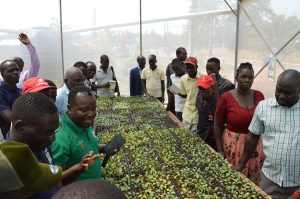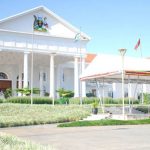
Gulu City
Research shows that 80 percent of vegetable farmers in the communities of Northern Uganda lose 40 percent of the seeds purchased from distributors and Agro Shops at raising stages due to inadequate skills in nursery setup and management.
Pascal Kahesi, the country support manager of Syngenta Vegetable Seed says 80 percent of vegetable farmers lose 40 percent of the seeds purchased from distributors and agro-dealers at raising stages due to inadequate skills.
This was revealed while training over 300 farmers in Gulu City adding that the Northern Uganda Horticultural Market Acceleration project, an initiative by Syngenta, ABI, and Techno Serve will help farmers improve their household income and produce high-quality produce for export.
“Our research has shown that 80 percent of vegetable farmers in Northern Uganda lose around 40 percent of their seeds purchased from agro-dealers and agro-shops due to inadequate skills in raising vegetables or growing in various regions. As a team, we have identified Northern Uganda as one of the affected areas and are working on training farmers on modern farming technologies to increase productivity through access to quality seeds, technologies, and agronomic practices”, he said.
Hence there is a need to develop Young Plant Raiser (YPR) centers in the vegetable growing regions in Uganda to minimize the losses in the sector and boost the household income of the farmers, promoting the export of safe fruits and vegetables.
“We expect farmers to produce quality yields in quantity numbers to put the market acceleration into action and also have off-takers and vendors ready to accept produce but the challenge has always been inadequate productions in terms of quantity and quality.
According to Kahesi, their goal is to train farmers on better farming practices and increase their productivity.
He further says from 2018 to 2020, a Dutch-funded project aimed to accelerate productivity in the integrated seed sector development (ISSD) in Uganda, focusing on vegetable communities.
However, the main problem was that farmers were not knowledgeable about how to raise seedlings, preventing them from transplanting and managing them effectively hence more work is needed to improve farmers’ knowledge and skills..
“As of today, the project has trained over 100 farmers, with 62 in Oyam and another 100 in Lira, the project also trained over 200 farmers in various districts, with an expected attendance of over 200.
According to Kahesi, Research from Makerere University reveals that 70% of Uganda’s soils lack sufficient organic or natural nutrients for farmers to produce the required yield.
However, to address this issue, integrated fertilization is recommended, combining organic and natural manure.
He revealed that natural manure helps maintain moisture and water, allowing crops to grow quickly, and inorganic manure aids in obtaining nutrients quickly, but it should be used in the right quantity and quality adding that misuse can lead to issues.
“As Uganda’s population grows, it is crucial to develop other scientific methods to ensure food productivity and security for the community. Integrating fertilization with organic and natural manure is essential to ensure the right balance between the two”, he said.
Florence Lukwero, a farmer from Alero sub-county Nwoya district told Ankole Time the knowledge attained will make her supplement her income.
Lukwero who says she has a small piece of land in Cuda and the biggest land in Alero is now planning to start planting eggplants after having had experience for the first time and during the season she got a lot of money to pay with her children in school.
She revealed that last year she planted rice on about 3 acres and another 2 acres of groundnuts which during the harvest season she didn’t harvest anything tangible out of the 5 acres.
Explaining that the experience she has learned and acquired from the training will make her put it into practice.
Samuel Otto, a farmer and also an agronomist from Gulu district says the training in Gulu is going to improve their capacity in producing herbivores and crops. Open-field crops often take down the best ones, but vegetable production has high potential if managed well.
He explains that the training will help the farmer learn how to manage crops from grazing to transplanting, and to raise seedlings and manage after harvesting.
Further explained that the training will help build capacity among other farmers, as they were advised to engage in vegetable production as vegetable production does not take long, but it has a good intent throughout the harvest time.
For example, tomatoes have a maturity period of three months, and within that time, if a good number of seedlings are raised, grown, transplanted, managed, and harvested, they can earn more financially than those growing maize, Otto cited.
“Vegetable production does not need to be grown on an extended field, as it can be grown on small areas of land or even in urban centers. However, it can be challenging if the farmer lacks skill in managing. Through the training, the farmer believes they can control some disinfection, which may help”, he added.
Otto further says the training will impact household income by allowing them to raise money within a short period, which is better than spending a lot of money moving around and growing something that may not yield much.
He however concluded that the training provided by the organization is crucial for farmers to improve their capacity and increase their income through vegetable production.



















